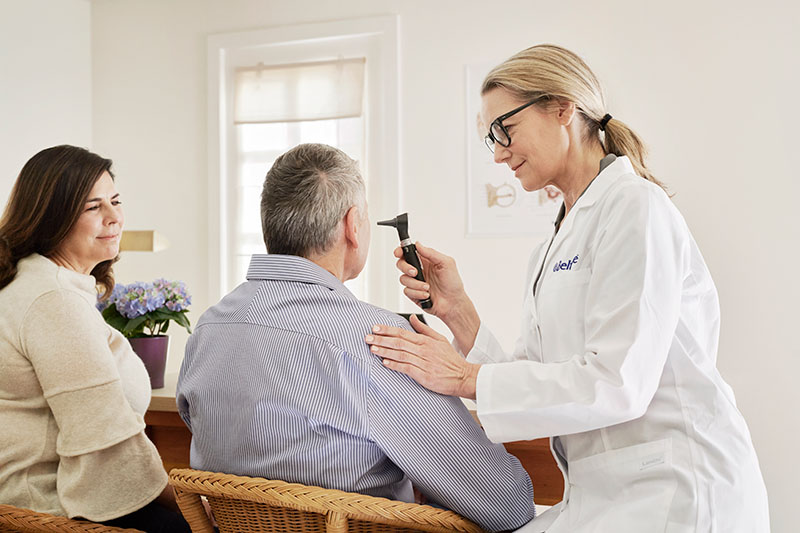Getting routine hearing tests should take at most 30 minutes; now and then, your doctor might ask you to take a hearing test. But you shouldn’t worry—it’s just a way for them to ensure your ears are working well.
As we get older, there’s a higher chance of having trouble with hearing. About 15% of American adults (37.5 million) aged 18 and over report some trouble hearing. And 14% of people between 45 and 64 years old have some hearing loss. But, for people 65 or older, it goes up to more than 30%.
Experts say that adults should have their hearing tested every ten years until age 50. After that, getting tested every three years is a good idea. These recommendations help catch any hearing issues early on and keep your ears healthy.
Continue reading to learn more about hearing tests, getting one, and what you shouldn’t do before your evaluation.
What is a hearing test?
A hearing test, or an audiometric evaluation, is a non-invasive diagnostic procedure to assess an individual’s hearing sensitivity. Audiologists or hearing care professionals conduct the exam, such as listening to tones or spoken words through headphones, to determine hearing thresholds across various frequencies.
Results are presented on an audiogram that shows a visual representation to healthcare providers so they can identify any concerns. Regular hearing tests are crucial to monitor changes and address potential issues early, especially with age. This will contribute to overall ear health and effective communication.
Hearing test process
While the specifics of the hearing test process can vary among healthcare providers, the general steps remain consistent for most individuals. Continue reading to discover how we at Beltone Tristate conduct a free hearing exam.
Step 1: Personalized Assessment
Understanding the impact of your hearing loss on your life is crucial. This initial step allows us to identify your symptoms, paving the way to a personalized solution tailored to your unique hearing needs.
Step 2: Video Ear Exam
Once acquainted with your situation, we screen your hearing using a video otoscope. This painless and non-invasive procedure visually examines your ear canal and eardrum, projecting images onto a computer screen. This helps us identify potential issues like earwax or infections affecting your hearing.
Step 3: Audiometric Test
The next phase of your hearing assessment involves an audiometric test. Utilizing advanced computerized equipment, we pinpoint the type of hearing loss you may be experiencing. Through a series of tests, including tone and speech testing, air and bone testing, and word discrimination testing, we evaluate how well you hear a range of sounds.
Step 4: Review of Results
In this final step, your dedicated hearing care professional reviews the results with you in simple language. We review your audiogram results, clearly explaining your level of hearing loss. If hearing loss is confirmed, we recommend the most suitable device from our full line of hearing aids. You can even try on the device in the store, and we’ll ensure a proper fit, allowing you to reclaim the joy of hearing and take control of your life.
How to prepare for a hearing test
Hearing tests play a crucial role in assessing your current hearing health. Untreated hearing loss can lead to significant consequences such as social isolation, cognitive decline, and strained relationships. Preparation is advisable to ensure a practical hearing test before visiting the audiologist’s office. Consider following these steps:
Choose the right audiologist
Select an audiologist whose location and office hours align with your daily life. Opt for convenience by choosing a professional near your work, home, or school, and explore options with flexible scheduling, including evenings or weekends if needed.
Avoid illness before the test
Sickness, especially colds or flu, can affect the accuracy of your hearing test due to mucous buildups in the middle ear. Stay healthy and avoid exposure to cold weather after a shower before the test.
Steer clear of loud noises
Loud noises can temporarily impact your hearing quality, affecting the test results. Be mindful of this and avoid exposure to noisy environments, like rock concerts, in the hours leading up to your hearing test.
Bring a companion
If you’re a first-time visitor to an audiologist, consider bringing a friend or family member along to ease any apprehensions. Having someone accompany you provides an extra set of ears for important information. It allows them to share insights on any observed hearing loss symptoms.
Have pen and paper ready
If you can’t bring a companion, keep a pen and paper on hand to jot down crucial information. This includes recording the results of your test and any relevant details provided by your audiologist. Whether you suspect hearing loss or not, scheduling an appointment with an audiologist in your area is recommended. They can assess your hearing, offer a diagnosis, and recommend any necessary treatment.
Take the first step to better hearing
Even a minor challenge with your hearing may indicate the need to explore further about your hearing loss. The expert hearing care professionals at Beltone Tristate are ready to assist you in making informed decisions. Contact us today at 888-595-8564 or connect with us to arrange your complimentary hearing test.

